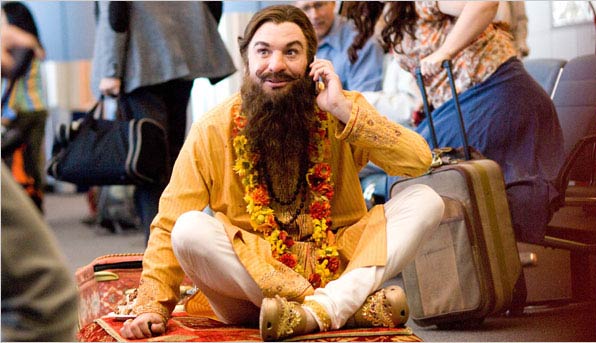ISKCON Statement on The Love Guru Make Waves
By ISKCON News Staff | Июл 26, 2008

Its official: Mike Myers’s raunchy take on Eastern spirituality, The Love Guru, has some seriously bad box-office karma. Although the film was accused of being anti-Hindu even before its release, the poor ticket sales seem to have more to do with the lowbrow jokes and tired bathroom humor than religious insensitivity.
Meanwhile, a statement issued by the Hare Krishna movement on the release of the film seems to have taken on a life of its own. The statement, issued by ISKCON’s North American Office of Communication, defends the film and tells protestors to, well, lighten up.
“Don’t get me wrong,” insists Vyenkata Bhatta Dasa, ISKCON’s North American Communications Director (and an ISKCON News Weekly editorial advisor). “I personally found the film to be crass, vulgar and generally not funny. But for its many cinematic faults, The Love Guru is not an anti-Hindu film, and certainly not an anti-ISKCON film. And if approached in the right spirit, the film may actually allow us to help people better understand the beauty and wisdom of India’s spirituality.”
Vyenkata was invited to pre-screen the film with journalists and movie reviewers three days before its official release on June 20.
Two major newswires, the Religion News Service (RNS), and the Indo-Asian News Service (IANS) reported the ISKCON statement. USA Today, the Dallas Morning News, and other major American media picked the stories up. The ISKCON statement was also a focal point of coverage by Yahoo News, MSN News, and a number or newspapers and news websites around the world. Newspapers in India, Ireland, Japan, the Philippines, and Thailand picked up the IANS story, entitled “Watch ‘Love Guru’ with a sense of humour, ISKCON tells Hindus.”
Vyenkata, who co-authored the ISKCON statement, was also asked to write opinion pieces on the film’s impact on the Hindu-American community. In a Beliefnet piece Vyenkata drew on his experiences as an ISKCON devotee and an American-born Hindu to present a more thoughtful and proactive approach to depictions of Hinduism in the media. His full-page editorial in India Abroad newspaper (also featured online at rediff.com) combined an analysis of the film with an exploration of a lesson that he learned from his own guru, ISKCON leader Radhanath Swami. And in an op-ed for ABCD Lady, an online magazine targeted to young South Asians, Vyenkata warned against knee-jerk reactions and short-term thinking.
“I think the statement has helped people to better appreciate ISKCON,” Vyenkata says. “They go ‘You guys [the Krishna devotees] have a sense of humor. You’re into tolerance and being broad minded. I respect that.’ Religious people can sometimes come off as defensive or self-righteous, so I think ISKCON devotees can set a great example by taking the opposite approach.”















